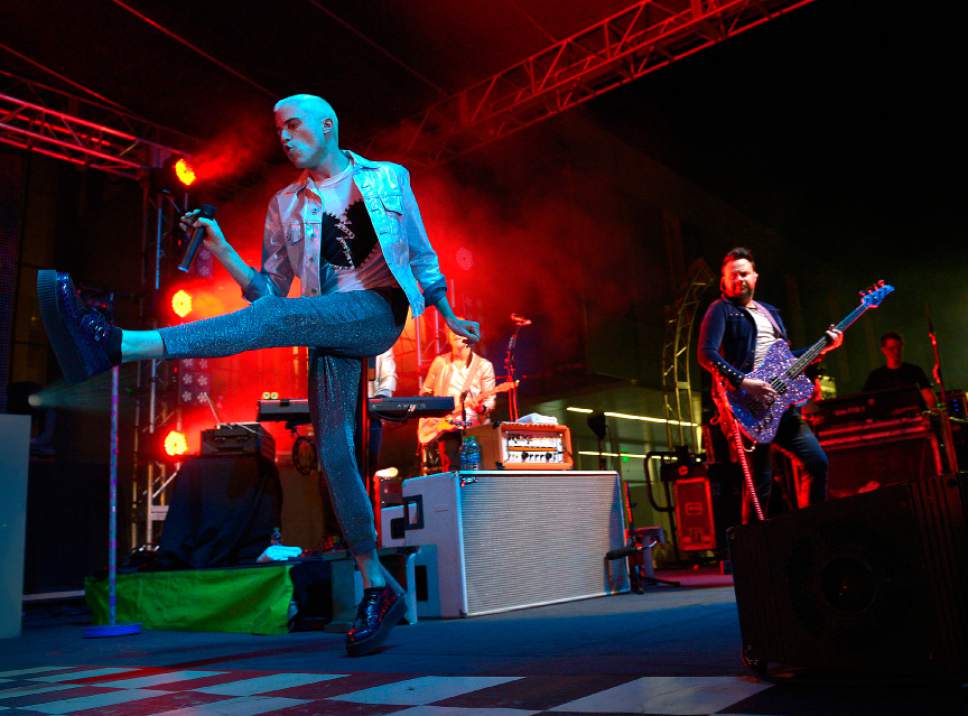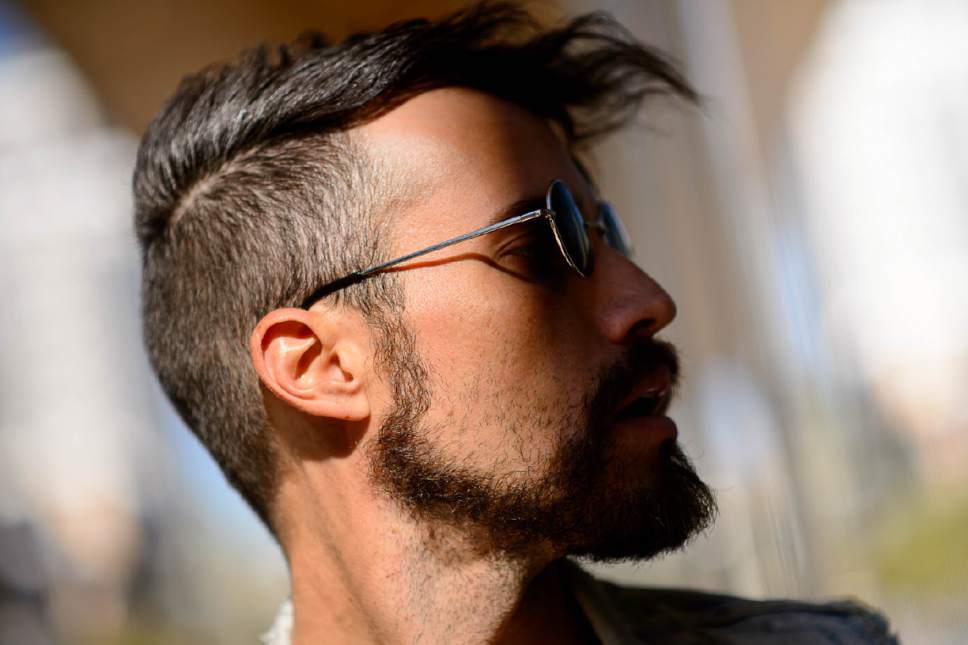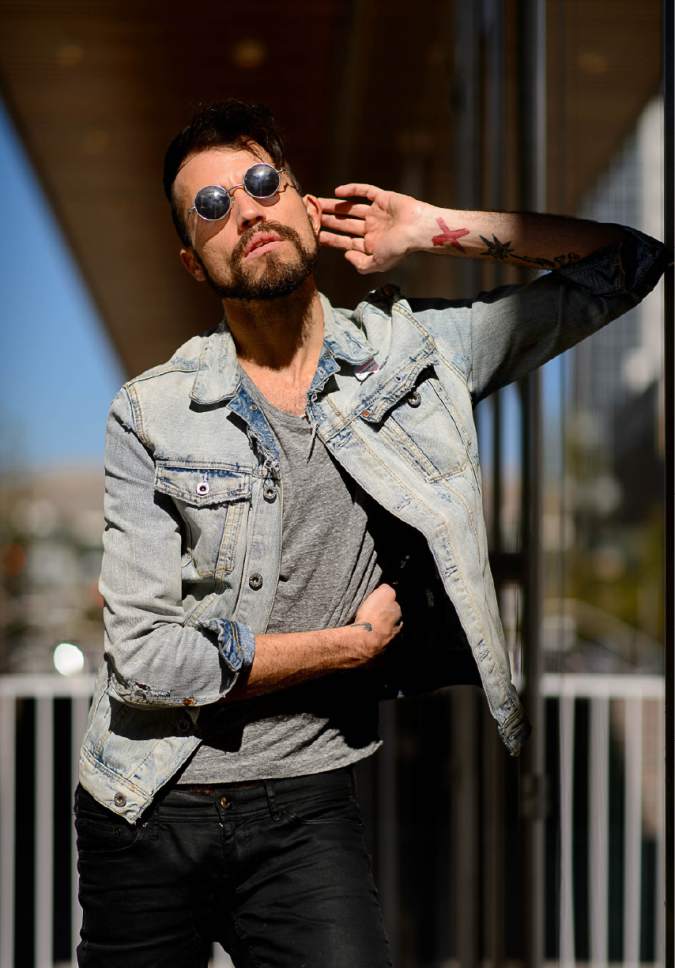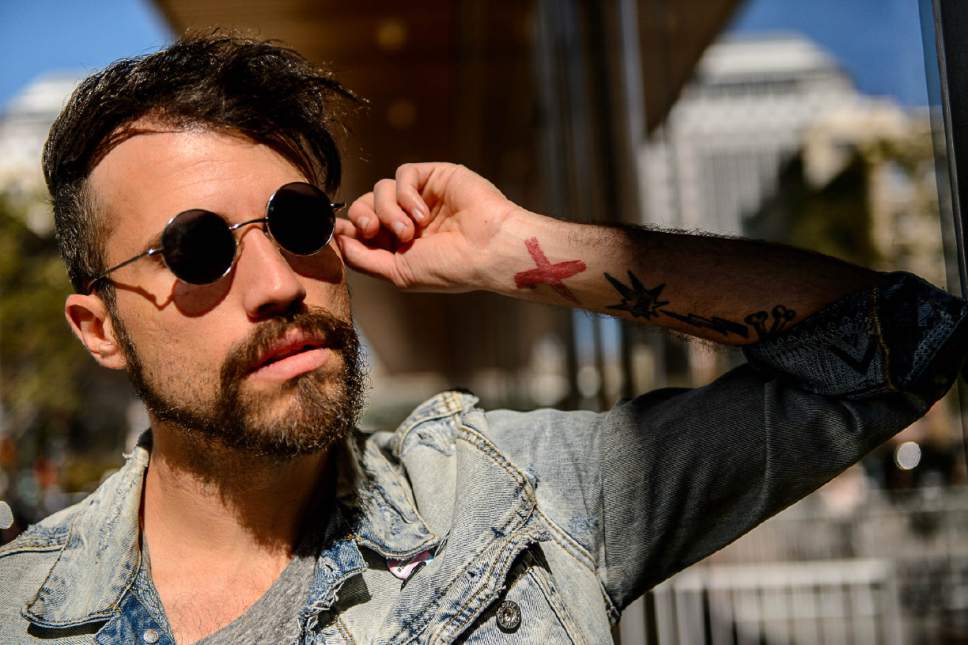This is an archived article that was published on sltrib.com in 2016, and information in the article may be outdated. It is provided only for personal research purposes and may not be reprinted.
Tyler Glenn slides into a booth at Eva's Bakery in downtown Salt Lake City not far from his apartment, about to squeeze an interview into what's already an action-packed afternoon. On his calendar later is a Facebook live stream, a performance at Equality Utah's annual Allies Dinner and an extended set at the 50 West Club, where the Neon Trees singer will do several songs from "Excommunication," his first solo album, which also comes out this day.
Glenn himself came out two years ago. For a gay Mormon in one of the most prominent bands Utah has ever produced, that action shined a rainbow-hued spotlight upon him. The LDS Church has had a troubled relationship with the gay community, but at that time, Glenn thought he could still make his faith work while living as an openly gay man. He continued to follow the church's teachings and last summer even gave a tour of Temple Square to his then-boyfriend.
"He asked me if I really believed it, and I said 'yes,' " Glenn says. "And then my life changed."
That happened last November, when The Church of Jesus Christ of Latter-day Saints initiated a policy that children of same-sex parents would be baptized only if they disavowed same-sex cohabitation and marriage, a divisive move that has caused a number of members to leave the church. For Glenn, it was as if a line had been drawn, and it has since made him also turn his back on the faith in which he once believed.
"My parents were devastated about the policy," says Glenn, who fights back tears frequently during our interview, still grieving deeply over his Mormon breakup. "I didn't really let myself be affected by it until I saw my dad's reaction. He's this stoic guy who never questioned, converted when he was 18, been a member for 40 years, and he was going, 'This is not good, this doesn't feel right.' That's when I really let it sink in. That night, I got drunk and looked at everything I had questions about, and it was really painful. I would wake up and feel so on fire by what I learned. 'I have to warn my family! We've been brainwashed!' — things like that. It was pretty manic at some points."
—
Spiritual cage-fighting • He's channeled his struggles with faith into "Excommunication," released Oct. 21, not just in its 13 songs, but on the cover, which depicts Glenn with a big red lipstick X drawn over his face as he poses, eyes closed, in front of the San Diego LDS Temple. Click the album up, and you'll hear God name-checked on practically every track, with Glenn sounding like he's locked in a spiritual cage-fighting match. "I used to feel it, now I don't feel it at all," he sings in "First Vision." In "Midnight," he asks, "God, where the hell are you hiding?" In "Devil," Sunday mornings "make me nervous, they don't feel like they used to feel," but Glenn ultimately declares "I found myself when I lost my faith." (Click here for a full review.)
"Excommunication" was largely inspired by Glenn's friendship with John Dehlin, creator of the popular "Mormon Stories" podcast, who last year was excommunicated for "conduct contrary to the laws and order of the church." Dehlin is now a vocal critic, and Glenn wrote a song about him that appears on the album, "John, Give 'Em Hell," a warm ballad, almost a hymn, that stands out among the more dance-oriented riffs on "Excommunication." "I heard your voice inside my darkness, you gave me something to hold on to," Glenn sings. "Sins and religion, what do they mean? Some say you're evil, but I think you're real."
"He's the most Mormon ex-Mormon I've ever met," Glenn says. "He's become one of my best friends. We met up for lunch once and ended up talking for four hours. And the song, I felt he deserved it, I wrote it as a gift. I wasn't going to put it on the record at first, but I've heard from a lot of people that it's their favorite song."
Then there's "Trash," where Glenn bitingly announces, "I think I lost myself in your new religion," before comparing his former faith to a drug that's been slipped into his drink. But it was the video for "Trash" that invoked outrage when it debuted in April. It showed Glenn lashing out at various LDS tenets, particularly a scene where he spits on a painting of Joseph Smith in which the Mormon founder has been redrawn to resemble a skeletonlike figure.
—
Facebook fallout • While most of the comments on the video were positive, backlash came as well on Glenn's Facebook feed:
"A lot of respect lost." "It's one thing to leave your faith, but to mock it on your way out is a little over the top." "How dare you use symbols that we hold most dear and sacred! How dare you mock them! You have nothing to be proud of." "I just lost all respect for Tyler Glenn." "Was a fan; now I'm not, hope you get into a wreck going to your next venue."
"I was expecting it; I wasn't naive," Glenn says about the reaction. "The thing I was not expecting was to have active members of the faith cry and weep at the video and really understand the context of it, and not just see it as a shock value, even though that's kind of what I intended it as. I was really touched by messages from people of the faith who were saying, 'Wait, we need to understand why he's doing this and why this even exists.' "
The video also caused some tension with his Neon Trees bandmates, two of whom, Branden Campbell and Elaine Bradley, are Mormon. The Provo-birthed band has released three major-label albums since a 2010 debut, and two Billboard top-20 singles, "Everybody Talks" and "Animal," earned the band global exposure, especially after they were featured in a pair of widely seen TV commercials for Buick and the Las Vegas Convention and Visitors Authority.
"I didn't warn them about the material," Glenn says. "Maybe that was an error on my part. It definitely caused a good two months of not communicating. But the present is really healthy."
Neon Trees guitarist Chris Allen agrees.
"It definitely affected the other guys in the band who are still in the church," says Allen, himself a former Mormon. "They were pretty upset for a while and communication wasn't very good. Then we had a good meeting, where we talked about if we could or even wanted to continue. We talked about boundaries, how this would affect the band's direction, how this was obviously a solo project and that he still wants to play with us and respects us. Fortunately, after everyone got to thinking about it, everything is good now."
Glenn says he's still trying to "wrap my mind around" what a Neon Trees record will sound like after "Excommunication."
"I don't think I'm an irresponsible lyricist, so I'm not going to be in Neon Trees touting that my bassist and drummer's religion isn't right," he says. "But at the same time, I need to find what can be fresh and cool and good for the band to write about. I don't want to put a ceiling on creativity, but I also asked them to understand there is context to this message in this record and I don't think I'm going to make another record like this. I look at 'Excommunication' as a very singular creative moment, something I felt I really had to do."
—
Self-discovery • Glenn says he's still very much in a period of post-Mormon self-discovery, and he's been imbibing some of the secular pleasures the church frowns upon: namely coffee and alcohol.
"It's so funny that I attached wrong or sin to those," he says. "Figuring out how to be a responsible drinker at almost 33 years old is an experience. You realize, 'Oh, this is what drinking a little too much last night feels like.' But it's also nice to be an adult and realize I can actually do that without shame and guilt attached, and that's good."
It's been weird but freeing to put out an album stamped with his name and not playing shows with the same people he's performed with for 10 years, he says, but he loves that his new music is finding its audience.
"I didn't make it just for ex-Mormons or gay people, and it's not an anti-religious or anti-Mormon record," Glenn says. "It's a pro-truth and transparency record for anyone who has felt small or marginalized or people who never felt like they fit into a system they were born into. It's part of a very long process of asking myself, who am I? I thought I had it figured out — I came out two years ago; I thought that was the big thing I had to get through to start living my life, but now I feel I finally can build a framework for how I want my life to be. I always felt so limited before, like I was trapped. With the church, you always feel like you have to live your life within this framework. Without that, I don't necessarily know what to put in place of it. I don't consider myself an atheist, but I don't know. I'm kind of letting myself float in that unknowingness."
That quandary has contributed to Glenn's recent struggles with depression. Talking things out with his parents has helped, but he sometimes struggles to make everything work.
"Before coming out, it was like I had a split personality, like I had a place to hide part of myself. I personally never felt the desire to end my life, but during that period, it was always about hanging on. ... There are days when I'm very confident and excited, days where I want to tell people it gets better, but I'm in a space right now where I'm still trying to figure things out myself. It's been a pretty low-high-low-high self-care kind of year for me, but being able to make this record has been my saving grace. I'm just happy it's not mine anymore, that it's out there for other people now."
Adds Dehlin: "I think he's lost friends. I think it's been hard on his family and his band. It's been painful to watch, but really inspiring to see how resilient he's been. A faith crisis alone can cause anxiety and depression, then add to that his sexuality and media exposure ... it's an overwhelming amount of stress and difficulty and pain and growth. I'm really inspired how strong he's been."
—
Another coming out • In many ways, Glenn says, telling people he loved that he was leaving the faith was as wrenching a decision as coming out gay was.
"The fear and anxiety that surrounds a faith transition is really specific, and I was so afraid to talk to my parents or any of my siblings about it because I did not want to sway their faith. I was afraid that if I told my younger brother — he looks up to me, he's got a kid and a wife — that he would also start looking at things and it would totally mess up their family and that's going to get in my head. So there was a lot of fear, and I was afraid to tell my parents. Then it just came spilling out one day."
But Glenn didn't have anything to worry about. His brother and sister were at his release party for "Excommunication," and his mother sent a loving note, which Glenn's brother read aloud to the crowd gathered at the 50 West Club.
"There's a lot of fear that's been removed from my life," Glenn says. "The fear that I would never be able to measure up simply because I'm a breathing gay man. The fear that I would never make it to that kingdom with my family. That pressure has been removed. And that is wonderful. For the first time in my life, I'm not afraid of anything."











